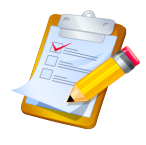
Vacation
Checklist: Prepare your PC
used with permission from Microsoft at
Work
 Whether you're leaving the office for the holidays, going on
vacation, or taking a business trip, there are a number of things you can
do to prepare your computer for your time away. Canceling appointments and
letting people know you'll be gone are just a few of the things you can do
to make sure your responsibilities are covered and people aren't trying to
meet with you. Here are some best practices to make sure your work goes on
smoothly, even when you're gone.
Whether you're leaving the office for the holidays, going on
vacation, or taking a business trip, there are a number of things you can
do to prepare your computer for your time away. Canceling appointments and
letting people know you'll be gone are just a few of the things you can do
to make sure your responsibilities are covered and people aren't trying to
meet with you. Here are some best practices to make sure your work goes on
smoothly, even when you're gone.
Decline upcoming
meetings
Decline or cancel any upcoming meetings that are scheduled
while you're gone. Co-workers will not expect you to be at meetings and
will know not to attend recurring meetings you run. To decline a meeting
using Microsoft Office Outlook 2003 and 2007, simply complete the
following:
1. Open the meeting occurrence and click Decline.
2. If you're the organizer of the meeting, either send a cancellation or arrange for a co-worker to run the meeting.
◦To cancel the meeting in Outlook 2003, open the meeting occurrence and in the Actions menu click Cancel Meeting.
◦To cancel the meeting in Outlook 2007, simply select the meeting tab and select the Cancel Meeting icon.
Update your voice
mail greeting
Record a voice message that lets people know you're
going to be out of the office for an extended amount of time. Provide the
name of the person to contact for immediate assistance and let people know
when you plan to return.
Make sure your
mailbox doesn't exceed size limits
If you're gone for a long time,
you run the risk of your Outlook 2003 or 2007 mailbox exceeding the size
limit set by your IT department. A full mailbox will prevent you from
sending or receiving e-mail while you're gone. Before you leave, use the
Mailbox Cleanup tool in Outlook to check the size of your mailbox and
manage its size. To use Mailbox Cleanup, on the Tools menu, click
Mailbox Cleanup. You'll be able to view the total size of your
mailbox and individual folders, find and archive items older than a
certain date, and more.
Block off time in
your calendar
Don't forget to mark your Outlook calendar to show
co-workers that you're gone. That way, they'll see you're not available
and won't schedule meetings with you. To block off the time, just create
an appointment in Outlook that shows you're out of the office:
1. In the File menu, point to New and click Appointment.
2. In Start time, select the date you're leaving. In End time, select the date you're returning.
3. If you're leaving for just one day, click the "All Day" event box.
4. Under Show time as, select Out of Office.
5. Click Save and Close.
Keep your
password from expiring
Your IT department might have a limit on how
long your password will be valid before you need to change it. If you're
going away for more than 14 days, change your network password to ensure
it won't expire while you're gone. To change your password, press
CTRL+ALT+DELETE and select Change Password.
Check in work
files
If you go on vacation with a file checked out, your team
members can't work on the most recent version of that file. Make sure to
check in all your files before leaving the office.
Secure your
laptop
Laptop computers are a common target of theft. If you're not
taking your laptop with you on vacation, take it home or lock it in your
desk. If you do take your laptop with you, learn 9 ways to secure your laptop on the road.
Turn on your Out
of Office Assistant
Use the Outlook Out of Office Assistant to let
people who send you an e-mail know you're away. This Outlook feature
enables you to set an automated reply to messages sent to you while you're
out. In the reply, let people know who to contact while you're gone. You
can also set up rules to file the messages you receive, send special
responses to specific people, and more.
To use the Out of Office Assistant in Outlook, on the Tools menu click Out of Office Assistant. You can create an autoreply message to let people know important information—such as when you'll be back and who to contact in the case of an emergency.